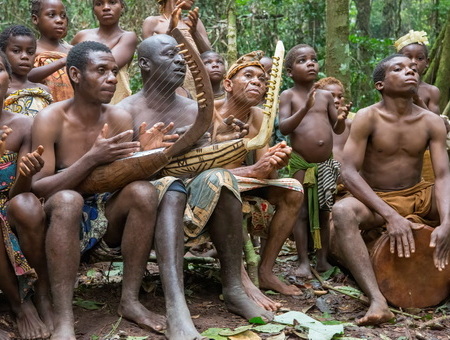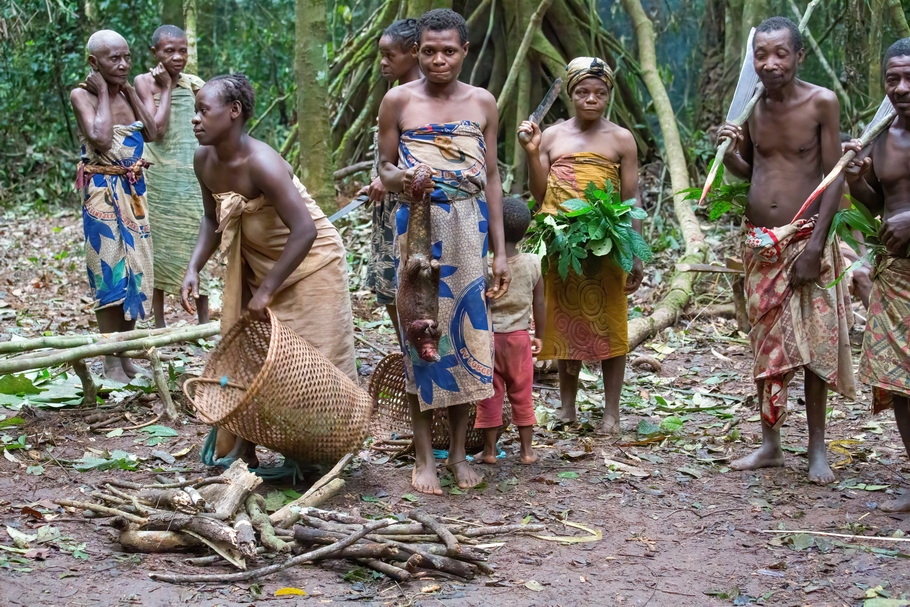The Baka people, often referred to as "forest people" or "pygmies," are an indigenous community renowned for their deep connection to the rainforests of Central Africa. Spanning Cameroon, Gabon, the Republic of Congo, and the Central African Republic, the Baka have lived harmoniously with nature for thousands of years. Their profound knowledge of the rainforest and their unique traditions make them one of the most fascinating indigenous groups in Africa.
A Deep Connection to the Forest
For the Baka, the rainforest is more than just a home—it is a source of life, culture, and spirituality. They rely on the forest for their food, medicine, and shelter, as well as for maintaining their traditions and spiritual practices.
Sustaining Through Nature
The Baka are skilled hunters, gatherers, and foragers. Their diet primarily consists of game meat, fish, honey, fruits, and nuts. Hunting is done using handcrafted bows, spears, and nets, while gathering involves collecting medicinal plants, wild yams, and other forest produce.
Sacred Forest Beliefs
The Baka hold a deep spiritual connection to the forest. They believe in a forest spirit called Jengi, who acts as a guardian and provider. Rituals and ceremonies honoring Jengi are integral to their cultural identity, symbolizing their respect for the natural world.
Cultural Practices and Traditions
The Baka culture is rich with oral traditions, music, and storytelling, which are essential for passing down knowledge and sustaining their heritage.
Music and Dance
Music is central to Baka life, often used in rituals, celebrations, and daily activities. They are known for their unique polyphonic singing, which mimics the sounds of the rainforest. Traditional instruments, such as drums and flutes, accompany their songs, creating a harmonious connection between the community and their environment.
Storytelling
Oral storytelling is another cornerstone of Baka culture. Elders share myths, legends, and lessons about the forest, teaching younger generations about survival, morality, and their people's history.
Communal Living
The Baka live in small, close-knit communities. Their traditional homes, known as mongulu, are dome-shaped huts made from leaves and branches. This communal lifestyle fosters a strong sense of unity and cooperation.
Challenges Facing the Baka People
Despite their rich cultural heritage, the Baka face numerous challenges in the modern era. Deforestation, land encroachment, and marginalization threaten their way of life.
Deforestation and Land Rights
Commercial logging, agriculture, and mining have led to significant deforestation in Central Africa, reducing the Baka’s access to their ancestral lands. These activities not only disrupt their traditional lifestyle but also threaten the delicate ecosystems they depend on.
Cultural Marginalization
The Baka are often marginalized within broader societies, facing discrimination and limited access to education, healthcare, and political representation. This exclusion undermines their ability to protect their rights and maintain their cultural identity.
Climate Change
Climate change poses another challenge, altering the balance of the rainforest ecosystem. Changes in weather patterns and biodiversity affect the availability of food and resources for the Baka communities.
Preserving Baka Culture and Heritage
Efforts to protect the Baka people and their rainforest home are essential for preserving their way of life and the biodiversity of Central Africa.
Promoting Indigenous Rights
Organizations and advocacy groups are working to secure land rights for the Baka, ensuring they can continue to access and protect their ancestral forests. Legal recognition of their rights is a critical step toward preserving their culture.
Sustainable Development Initiatives
Eco-friendly development projects and sustainable tourism offer opportunities to support the Baka without harming their environment. Ethical tourism allows visitors to learn about Baka traditions while contributing to their community in a positive way.
Education and Healthcare
Programs that provide culturally sensitive education and healthcare services are helping to improve the quality of life for the Baka while respecting their unique lifestyle.
Conclusion
The Baka people are more than just inhabitants of the rainforest; they are its protectors, historians, and spiritual custodians. Their deep knowledge of the forest ecosystem and their harmonious way of life offer valuable lessons about sustainability and respect for nature.
As the world grapples with environmental and cultural challenges, supporting the Baka people is crucial—not only for their survival but also for the preservation of the rainforests they call home. By celebrating their heritage and addressing the threats they face, we can ensure that the Baka’s legacy endures for generations to come.




















0 Comments
Have thoughts or questions? Share your insights below and join the journey back in time to discover the world’s enduring traditions!